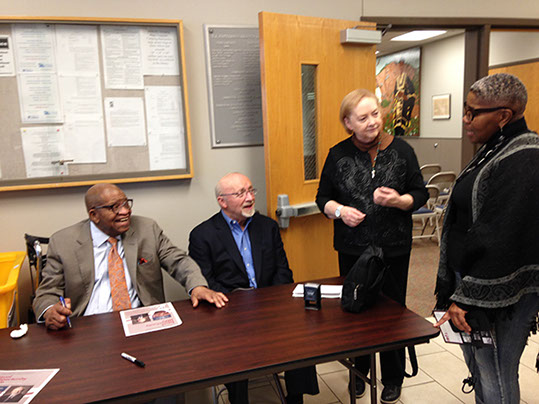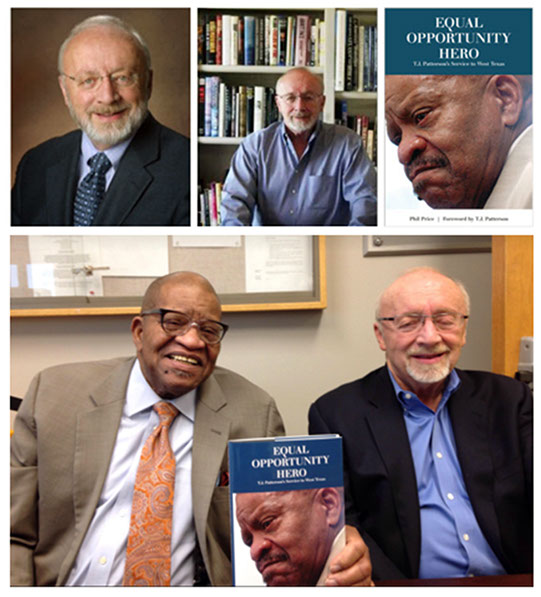Each week Lone Star Literary profiles a newsmaker in Texas books and letters, including authors, booksellers, publishers.
 Kay Ellington has worked in management for a variety of media companies, including Gannett, Cox Communications, Knight-Ridder, and the New York Times Regional Group, from Texas to New York to California to the Southeast and back again to Texas. She is the coauthor, with Barbara Brannon, of the Texas novels The Paragraph RanchA Wedding at the Paragraph Ranch.
Kay Ellington has worked in management for a variety of media companies, including Gannett, Cox Communications, Knight-Ridder, and the New York Times Regional Group, from Texas to New York to California to the Southeast and back again to Texas. She is the coauthor, with Barbara Brannon, of the Texas novels The Paragraph RanchA Wedding at the Paragraph Ranch.
12.17.2017 Lubbock adman and first-time book author Phil Price reflects on a lifetime of marketing and messaging
“It is easier to write about yourself than getting the facts correct about another person and compiled in a nonfiction book,” Lubbock adman Phil Price discovered five years ago when he undertook to tell the story of a fellow businessman and community leader who just happened to be a black man in majority-white West Texas.
On May 11, 1970, one of Texas’s most devastating tornadoes in history hit Lubbock, essentially wiping out the city’s bustling downtown. Price, discharged from the military that same day after finishing his tour of duty in Vietnam, had come home to a country that was less than supportive of the war. Price’s challenges were compounded by the tornado. He had expected to return stateside to a position as vice-president of a Lubbock publishing company—a career that never occurred thanks to the tornado’s destruction.
Instead, Price went into the ad business. For more than four decades he served as CEO of the company he founded and served the Lubbock community in a variety of civic and volunteer capacities.
Along the way, he became friends with T. J. Patterson the first African-American elected to Lubbock’s city council, who was an activist and community organizer. The biography of Patterson, Equal Opportunity Hero is Price’s first published book. Get to know these two trailblazers in this week’s Lone Star Listens.
LONE STAR LITERARY LIFE: Where did you grow up, Phil, and what influence did your upbringing play in your future writing life?
PHIL PRICE: Hollis, Oklahoma, was my first adventure in the arts. I produced and directed a play for my school. Plagiarism. Hansel and Gretel. The audience stood and applauded. I was hooked.
In 1972, you opened the Price Group, located in Lubbock, which grew to become one of the most highly regarded advertising agencies in the state. What made you decide to open an ad agency?
In May 1970, I had been honorably discharged from the Army when the tornado hit downtown Lubbock that same evening. My opportunity of returning to my job as a vice-president of a local publishing company vanished with downtown.
As a new agency owner, I was fortunate to obtain Malouf’s Gentleman’s Fine Clothing and Gene Messer Ford as clients in the same week. I always believed that advertising was as important as the product itself. As their businesses grew, so did my agency. We had the unusual tactic, at that time, of marketing and branding before those buzzwords were popular. John Malouf and Gene Messer taught me about their businesses. I added the creativity of advertising, and their merchandise sold.
The early 1970s could probably be described as a golden age of advertising in America. There was no Internet, there was no social media, and there were only three TV networks (and in the Lubbock market, a handful of radio stations). Creative, be it in TV or radio commercials, billboards or print, could make or break a business. What were some of your proudest moments at the helm of the Price Group?
Some of the proudest moments of my career have been watching my former employees grow. They have moved to different jobs in larger cities, become managers, agency owners, and national award winners. Other employees are still with the Price Group today. When I retired in 2012, two employees bought my agency. They were with the company collectively over forty-five years. They are great people still doing great advertising.
Since handing over the reins of the Price Group to a new group of owners, you've been focused on writing. What sorts of things have you been writing?
I knew there was a time for my retirement from advertising. I had been writing thirty-second and one-minute commercials for more than forty-two years. I loved it. Upon retirement from advertising, I had five completed book manuscripts, four of them fiction. I thought all I had to do was find an agent that liked one of my books and get published.
During the course of your tenure at the helm of the Price Group, you became friends with Lubbock news publisher and community leader T. J. Patterson, and now you've written a biography of his life. Tell us about Patterson, the “Equal Opportunity Hero” of your book.
I chose the nonfiction as the direction of my new literary career. Texas Tech University Press was interested in Equal Opportunity Hero: T. J. Patterson’s Service to West Texas, a history of local and West Texas segregation and integration. I felt the university press might be my quickest answer to being published… it has only taken five years!
What are the challenges of telling someone else's real-life story?
Nonfiction is more difficult than a thirty-second or one-minute commercial. You can’t hit the delete button and change a character or story line. Facts are necessary. Names must be spelled correctly, and dates are mandatory. Plus an index… not so with fiction.
The challenge of writing a book on T. J. Patterson has been a labor of love and enlightenment. Equal Opportunity Hero is the history of one man who lived through segregation and integration in West Texas. Laws and prejudices were against him, yet, he thrived. He lived those changes. He has made a difference.
Not only are T. J. and I friends, we enjoyed community service together. One quote that I have remembered someone telling us and that I have kept close to my heart is, “When two great men work together, great things happen.” T. J. is a great man and I am proud to work with him.
I have been acquainted with and enjoyed the friendship of T. J. Patterson for more than twenty years. But in the last five years I have learned who he is.
- When blacks were not allowed in all-white hospitals, T. J. survived polio as a child.
- When blacks were not allowed to attend Texas Tech University, he became a professor.
- When his country asked him to go to war, he did.
- When blacks did not hold public office in West Texas, he served twenty years as city councilman.
- When blacks did not own major businesses, he established a newspaper.
- When prisoners needed ministry, he served.
- When drug dealers occupied his neighborhood, he confronted.
- As a child, T. J. brought kindling to school for the fire to keep warm. As a man, he is still serving Lubbock and West Texas.
Thank you, T. J. Patterson, our Equal Opportunity Hero.
Your sister is Jodi Thomas, one of this generation's most prolific and well-regarded romance novelists. Do you two brainstorm writing ideas either long-distance or in person?
Those descriptions are yours. She has always been my little sister. I am very proud of her accomplishments and she casts a very long shadow. The family says the two of us are very creative. You might say we both live in fiction; she in romance, me in advertising. ☺ We brainstormed more when she was in the infancy of her literary career. (I think I mess with her charted plot and she seems to be doing well without my input.) We see and talk often even though we are in separate towns. Having lunch in the town in-between seems to satisfy our need to catch up on family matters when we are unable to fit in a full trip in either direction. She nor I either one are short on opinions or accolades for the other.
What advice do you have for other authors who are struggling to get published just as you did?
My suggestions for other writers is as Jodi has always told me. Write.
What's next for Phil Price?
Keep writing. Get [my other books] published and ask my sister questions.

Above, from left, at Phil Price’s book launch at Lubbock’s Roots Arts Council Dec. 16: “Equal Opportunity Hero" T. J. Patterson; biographer Price; Price’s sister, bestselling author Jodi Thomas of Canyon; and Patterson’s daughter Sheila Patterson Harris, now serving as a second-generation member of Lubbock’s city council. (Photo by John Brock, Texas Tech University Press)
* * * * *
Praise for Phil Price’s EQUAL OPPORTUNITY HERO
”In this book Patterson shines, not only in the glow of his own achievements but in the obvious affection and respect the author has for him.” —Bibliotica
“This book is a perfect example of an individual's passion that sparked societal growth. It’s not always a straight line, but the end result is a fact-based, creatively-written story about a man who was a catalyst for forward, positive change and progress.” —A Page Before Bedtime
* * * * *

